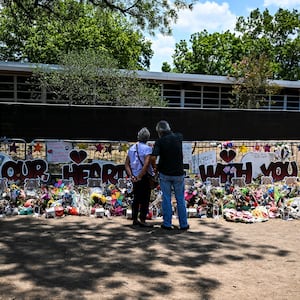For students, the first day of school has always been full of anxieties: What will you wear? Will you like your teachers? Who will you sit with at lunch? But for Generation Z, there’s another consideration that accompanies the first day of school: Will I be safe?
Neelufar Jaberi, a 17-year-old high school senior in Michigan, said she feels three things about returning to school: frustrated, upset, and terrified.
After watching so many mass shootings—including the Oxford High School shooting that took place 45 minutes from her school more than a year ago—Jaberi and a friend made it their business to reduce those fears. They started the Lansing Chapter of March for Our Lives, which works with the better known youth gun reform organization March for Our Lives that students formed after a mass shooting at Marjory Stoneman Douglas High school in Parkland, Florida.
“We’re all uneasy. We all know that we can’t, with 100 percent certainty, go to school and be 100 percent safe because there is a possibility of something happening,” Jaberi said. “We just want to go to school and learn and get our education without having this fear just right above our head.”
While some lawmakers in Washington seem satisfied with the most recent gun compromise—with Democrats accurately describing June’s “Bipartisan Safer Communities Act” as the most significant gun control package in 30 years—students are far less impressed. They note there’s still a gun violence issue in schools, and that the reforms President Joe Biden signed in late June won’t end school shootings.
Nearly 80 percent of parents with a school-age child believe their children will have challenges going back to school this fall, according to a poll conducted this month, with the No. 1 factor being safety concerns.
Activists like Jaberi said the new law isn’t enough. Schools can only do so much, she noted, and the lives of students are in the hands of politicians who could pass stronger legislation.
“The package that Congress has passed is amazing. It’s a good step forward,” Jaberi said. “You know, what also is terrifying on that end is, is this going to be where they say we have done our job and passed one thing, and we’re done? Because that would not be enough. We need more action.”
That concern also resonates with John Feinblatt, president of gun control advocacy group Everytown.
“The Bipartisan Safer Communities Act broke a nearly 30-year logjam in Congress and meets the most fundamental test for any gun safety legislation: it will save lives,” Feinblatt said in an email to The Daily Beast. “However, nearly everyone—from gun safety groups to gun sense champions in Congress and the White House—has been clear that it’s a step forward, not the end game. The daily toll of gun violence is a relentless reminder that the gun industry cares more about profits and politics than public safety.”
While Democrats in Congress would love to pass additional gun measures, Republicans have made it clear they aren’t willing to go along with even more restrictions. Republicans are not amenable to an assault weapons ban. They are not going to help pass universal background checks. And they are not going to raise the age for buying a gun.
After the shooting in Uvalde, Texas, most Republican Senators made it clear they weren’t willing to support any significant gun reforms. When The New York Times asked Sen. Kevin Cramer (R-ND) what the reaction would be from voters if he supported new gun reforms, Cramer was unambiguous: ”Most would probably throw me out of office,” he said.
Another Republican Senator, John Barrasso of Wyoming, said he didn’t want additional gun restrictions because Republicans “don’t want to take away the rights of law-abiding citizens.”
Democrats could continue pushing for new laws—the House voted at the end of July for an assault weapons ban—but doing so might diminish the agreement they’ve already achieved. And Democrats have been clear that they are proud of the bill they did pass.
“This bill will be too little for many. It’ll be too much for others. But it is not a box checking exercise,” said Sen. Chris Murphy (D-CT), one of the leading gun reform advocates in Congress. “This bill is not window dressing. This bill is going to save lives.”
That very well may be true, but unlike most of Congress, students still don’t think the reforms that passed in June are enough.
For Aanya Pande, a 16-year-old junior who attends school in Florida, school shooting concerns aren’t always top of mind, but they’re still a real concern.
“I’m not thinking about that when I’m at school,” Pande said. “But if I sit down and think about it, like I’m doing now, yeah, I do worry a lot.”
Pande was clear that students believe school shootings are still going to be an issue, even after Congress passed its sweeping gun reforms. And she was clear that lasting solutions would have to come from Congress.
“Lawmakers have the most power,” she said. “They have to mandate these things.”
Pande also noted a new normal, where students her age have dealt with gun and bomb scares and lockdown drills for the entirety of their schooling, and while they’ve learned to live with those realities, it’s still not an acceptable situation.
“Around the time a school shooting happens, everyone’s, like, really nervous and I get texts and people being terrified of going back to school, but most of us have been, like, really desensitized to it by now,” Pande said. “But I do think it’s really, really scary and I think everyone thinks this in the back of their minds: ‘What school is going to be next?’”
March for Our Lives Press Secretary Noah Lumbantobing said there’s not enough forceful action at each level of government “taking serious urgent action.” While he said he believes passing the bipartisan gun bill was proof that change is incremental and finding common ground is possible, it’s not enough and lives continue to be at stake.
“This bill was imperfect, but it is going to save lives,” he said. “And that’s what progress is.”
“But that’s not enough,” he continued. “And anyone who thinks that that’s enough is kidding themselves, because people continue to die.”
For most student activists, the work isn’t over. They’re continuing to push for universal background checks, an assault weapons ban, and community violence intervention.
The mass gun violence across the country has undoubtedly left a red stain on Americans, but especially the youth, who are no strangers to bloody headlines. As these shootings become more frequent and deadlier, organizations like March for Our Lives have been pleading for tighter firearms restrictions.
Firearms are the leading cause of death for children under 20 years old. More than 3,500 children and teens are shot and killed every year, with nearly 15,000 more wounded in shootings, and about 3 million children and teens are exposed to gun violence, according to Everytown for Gun Safety, a nonprofit group that analyzed Centers for Disease Control and Prevention (CDC) data from 2016 to 2020.
So even as Congress may be content with the legislative product they’ve already delivered this year, students returning to school are still hoping for more.
Lumbantobing noted that March for Our Lives has been helping to register hundreds of thousands of voters in advance of the midterm elections, and they want to see politicians do more than just speak positively about addressing gun violence.
“I don’t think that just being a Democrat will get you a pass with March for Our Lives,” he said. “This isn’t just a hot button issue. This isn’t a fun thing to talk about to get you elected. This is about people’s lives. And it’s our intention to make that clear to politicians in the cycle.”
Regardless of the political realities in Congress, there are plenty of lawmakers trying to impose tighter gun laws. Chicago Rep. Danny Davis (D-Ill), who represents a district where gun violence is a problem, said the United States has no choice but to make progress on this issue.
“Every time we prevent one individual from being maimed or killed, then it’s worth the effort,” Davis said.
Raising the minimum age and dealing with mental health needs wouldn’t be a panacea, but it would work toward limiting access to semi-automatic and automatic weapons, what he called “weapons of war.”
“Semi-automatic weapons and automatic weapons have no business in the hands of individuals who are not in military or law enforcement activity. That to me, is number one,” he added.











